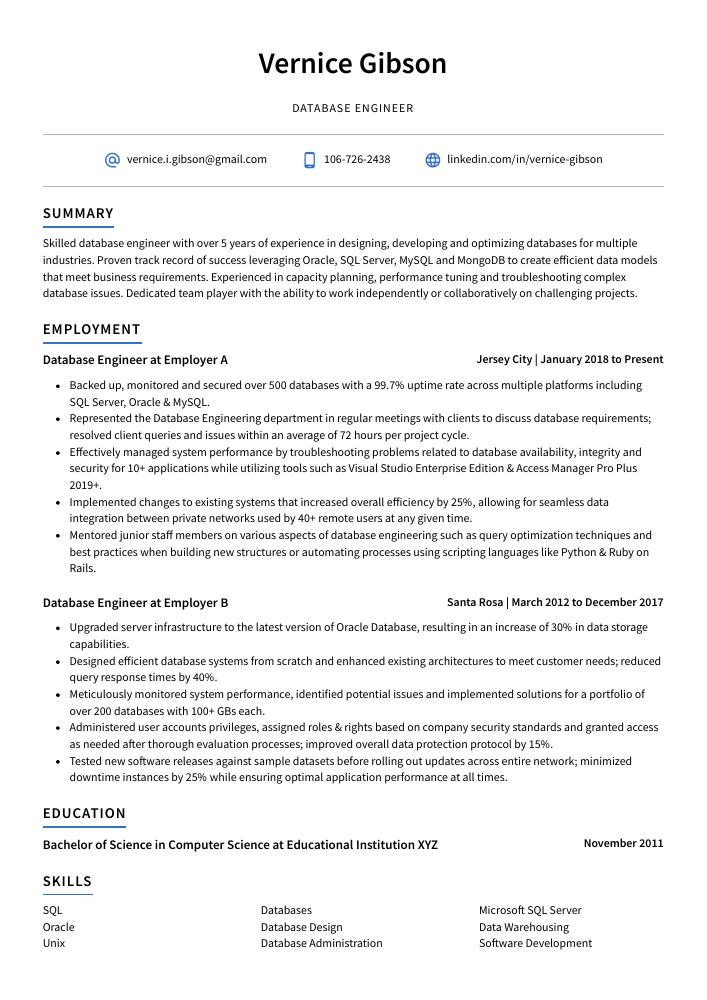Database Engineer Resume Guide
Database engineers design, develop and maintain databases to ensure their integrity, security and performance. They are responsible for analyzing user requirements, designing database structures and writing scripts to automate data manipulation processes. Additionally, they monitor the system’s activity to identify any potential issues or risks related to data storage and retrieval.
Your expertise in database engineering is unmatched. To get employers to take notice of your skills, you need to write a resume that sets you apart from the competition.
This guide will walk you through the entire process of creating a top-notch resume. We first show you a complete example and then break down what each resume section should look like.
Table of Contents
The guide is divided into sections for your convenience. You can read it from beginning to end or use the table of contents below to jump to a specific part.
Database Engineer Resume Sample
Vernice Gibson
Database Engineer
[email protected]
106-726-2438
linkedin.com/in/vernice-gibson
Summary
Skilled database engineer with over 5 years of experience in designing, developing and optimizing databases for multiple industries. Proven track record of success leveraging Oracle, SQL Server, MySQL and MongoDB to create efficient data models that meet business requirements. Experienced in capacity planning, performance tuning and troubleshooting complex database issues. Dedicated team player with the ability to work independently or collaboratively on challenging projects.
Experience
Database Engineer, Employer A
Jersey City, Jan 2018 – Present
- Backed up, monitored and secured over 500 databases with a 99.7% uptime rate across multiple platforms including SQL Server, Oracle & MySQL.
- Represented the Database Engineering department in regular meetings with clients to discuss database requirements; resolved client queries and issues within an average of 72 hours per project cycle.
- Effectively managed system performance by troubleshooting problems related to database availability, integrity and security for 10+ applications while utilizing tools such as Visual Studio Enterprise Edition & Access Manager Pro Plus 2019+.
- Implemented changes to existing systems that increased overall efficiency by 25%, allowing for seamless data integration between private networks used by 40+ remote users at any given time.
- Mentored junior staff members on various aspects of database engineering such as query optimization techniques and best practices when building new structures or automating processes using scripting languages like Python & Ruby on Rails.
Database Engineer, Employer B
Santa Rosa, Mar 2012 – Dec 2017
- Upgraded server infrastructure to the latest version of Oracle Database, resulting in an increase of 30% in data storage capabilities.
- Designed efficient database systems from scratch and enhanced existing architectures to meet customer needs; reduced query response times by 40%.
- Meticulously monitored system performance, identified potential issues and implemented solutions for a portfolio of over 200 databases with 100+ GBs each.
- Administered user accounts privileges, assigned roles & rights based on company security standards and granted access as needed after thorough evaluation processes; improved overall data protection protocol by 15%.
- Tested new software releases against sample datasets before rolling out updates across entire network; minimized downtime instances by 25% while ensuring optimal application performance at all times.
Skills
- SQL
- Databases
- Microsoft SQL Server
- Oracle
- Database Design
- Data Warehousing
- Unix
- Database Administration
- Software Development
Education
Bachelor of Science in Computer Science
Educational Institution XYZ
Nov 2011
Certifications
Oracle Certified Professional, MySQL Database Administrator
Oracle
May 2017
1. Summary / Objective
Your resume summary/objective is the first thing a potential employer will read, so it’s important to make sure you get their attention. As a database engineer, your summary should highlight your experience with various databases and platforms such as Oracle, SQL Server, MongoDB etc., any certifications or qualifications you have obtained in this field and how you have used data engineering techniques to improve efficiency at previous companies.
Below are some resume summary examples:
Amicable and detail-oriented database engineer with 6 years of experience developing and managing complex databases. Proven track record in designing, implementing, maintaining, and supporting large scale SQL/NoSQL systems. Skilled in troubleshooting technical issues while ensuring the highest levels of availability, performance and security for customer data. Eager to join ABC Tech’s engineering team to better serve its customers with robust solutions backed by reliability.
Passionate database engineer with 8+ years of experience architecting and optimizing databases for web-based applications. Skilled in developing efficient SQL and NoSQL queries to ensure the highest levels of performance and scalability. Experienced in designing, implementing, troubleshooting, monitoring and securing database systems on AWS cloud platforms. Looking to use my skills at ABC Tech to build robust data infrastructure solutions for their customers.
Well-rounded database engineer with 8+ years of experience designing and implementing databases for a wide range of applications. Possess in-depth knowledge of SQL, MongoDB, Oracle Database, Redis, Cassandra, and other technologies. Proven track record in optimizing system performance by 30% within 3 months period at last position. Seeking to join ABC Company as a Senior Database Engineer to leverage expertise in managing complex data architecture projects.
Driven database engineer with 7+ years of experience in designing, developing and managing databases for large organizations. Experienced in both relational (SQL) and non-relational (NoSQL) database systems. Highly proficient at creating optimized queries to improve performance and scalability while maintaining data integrity. Proven track record of successful projects such as migrating a large Oracle database to MongoDB cluster within budgeted timelines.
Hard-working Database Engineer with 8+ years of experience developing, managing and optimizing databases for companies. Skilled in data modeling to ensure accurate representation of complex relationships between entities, as well as database security technologies to guarantee safety from malicious actors. Seeking a role at ABC Tech where I can leverage my expertise in designing high-performance solutions that improve operational efficiency.
Enthusiastic database engineer with 5+ years of experience in database design and development. Skilled at designing, developing, testing and deploying databases for applications requiring high scalability and reliability. Experienced in working on both relational (Oracle) as well as NoSQL (MongoDB) platforms to ensure optimal performance. Adept at troubleshooting issues related to data integrity, query optimization & security measures.
Committed database engineer with 8+ years experience in designing, developing, and maintaining relational databases. Highly skilled at writing complex SQL queries to optimize database performance and ensure data accuracy. At XYZ Company, designed a robust back-end system that enabled the company to increase its customer base by 30%. Experienced in troubleshooting database issues across multiple platforms (Oracle/SQL Server).
Accomplished database engineer with 8+ years of experience developing and managing databases for a variety of industries. Seeking to join ABC Tech and leverage expertise in SQL, Oracle, PostgreSQL, MongoDB, NoSQL, AWS Cloud Services to develop innovative solutions that optimize performance and reduce costs. Key accomplishments include designing an efficient database architecture which reduced query time by 40%.
2. Experience / Employment
In the experience/employment/work history section, list your roles in reverse chronological order. This means that the most recent role should be listed first.
When writing about what you did, stick to bullet points for ease of reading and understanding. You want to make sure that each point is detailed enough so that it conveys a clear picture of what you were responsible for and how successful you were at achieving results. For example, instead of saying “Created database models,” say something like “Developed complex relational databases with normalized data structures, resulting in improved query performance by up to 40%.”
To write effective bullet points, begin with a strong verb or adverb. Industry specific verbs to use are:
- Designed
- Administered
- Optimized
- Monitored
- Implemented
- Developed
- Configured
- Troubleshot
- Installed
- Upgraded
- Backed
- Tested
- Debugged
- Analyzed
- Documented
Other general verbs you can use are:
- Achieved
- Advised
- Assessed
- Compiled
- Coordinated
- Demonstrated
- Expedited
- Facilitated
- Formulated
- Improved
- Introduced
- Mentored
- Participated
- Prepared
- Presented
- Reduced
- Reorganized
- Represented
- Revised
- Spearheaded
- Streamlined
- Structured
- Utilized
Below are some example bullet points:
- Improved database performance and security by 20% through data modeling, index tuning, query optimization and database restructuring.
- Assessed the integrity of existing databases in order to identify any areas needing improvement; conducted regular reviews of stored procedures & triggers for errors or discrepancies.
- Successfully migrated 30+ customer databases from Oracle to AWS SQL Server with zero downtime or data loss; reduced operational costs significantly as a result.
- Troubleshot complex issues related to database structure, connectivity, access rights and user privileges across multiple environments utilizing an array of troubleshooting tools/methods such as T-SQL queries & scripts development.
- Analyzed system logs on a daily basis for identifying potential threats/risks posed to critical business applications via monitoring software like Splunk & LogRhythm.
- Developed and maintained over 20 databases and related programs, increasing the efficiency of data entry by 30%.
- Facilitated an overhaul of legacy systems to create a more efficient database architecture that reduced system downtime by 40%.
- Introduced automated backups for all customer databases resulting in secure storage of information with zero loss or corruption.
- Streamlined processes for importing/exporting CSV files into the mainframe, improving overall performance throughput by 25%.
- Accurately identified and resolved 60+ technical issues per week relating to database security & query optimization.
- Thoroughly designed, developed and implemented database solutions for a wide range of applications; optimized 20+ databases to improve performance by 40%.
- Installed new software components in the existing database infrastructure and managed various upgrades with minimal disruption to production systems.
- Presented data-driven insights on customer trends at weekly meetings, resulting in an increase of $1 million annual revenue from targeted campaigns.
- Spearheaded projects that involved transitioning legacy databases into modern cloud-based versions while maintaining accuracy throughout data migrations processes; reduced migration time by 50%.
- Monitored system health metrics daily, proactively identified any potential issues before they affected stability or availability, and took corrective action as required to ensure maximum uptime for all user queries and transactions (99% SLA).
- Advised 20+ teams on database design and implementation best practices, resulting in a 10% performance increase while reducing data inconsistency errors by up to 15%.
- Documented over 200 database schemas & query processes for clients, ensuring that all systems could be maintained without disruption of service or loss of data integrity.
- Utilized SQL Server Management Studio (SSMS) and other tools to administer over 100 databases with an average uptime exceeding 99%, resulting in zero outages during peak hours.
- Monitored system health proactively using automated alerts via monitoring dashboards; conducted regular maintenance tasks such as defragmenting indices, reorganizing tables & indexes etc., increasing response times by 25%.
- Substantially improved the security architecture of client databases through the implementation of robust authentication measures; reduced external attacks by 90% within 3 months from launch date.
- Efficiently designed and implemented complex databases to support business applications, resulting in a 30% reduction in query response time.
- Revised database schemas for optimal performance by migrating data from legacy systems, eliminating redundant tables and optimizing SQL syntax; improved indexing of large datasets by 50%.
- Structured logical models for application development using ER diagrams & normalization techniques, ensuring all users had access to required data without compromising security or privacy regulations.
- Participated actively in the design process of new software projects to ensure maximum compatibility with existing database structures; completed 3 such projects on-time within budget parameters while maintaining high quality standards throughout the project life cycle.
- Configured MySQL servers according to customer requirements and optimized queries through stored procedures, triggers & views – achieving 70% improvement in server response times across multiple instances running simultaneously.
- Formulated and implemented database architecture strategies and procedures that improved data accessibility by 20% while reducing complexity.
- Compiled, organized and maintained large databases of over 10 million records; prepared regular reports for senior management on system performance metrics.
- Prepared comprehensive documentation packages to ensure the smooth transition from development to production phases with zero downtime; consistently monitored database activity logs and provided technical support as needed in order to maintain optimal performance levels.
- Consistently analyzed existing systems for possible optimization opportunities, resulting in reduced query times by 30%.
- Reorganized complex datasets into a more efficient format which saved up to 8 hours per week spent on administrative tasks related to accessing data points quickly for reporting purposes.
- Demonstrated advanced knowledge in database design, development and operations to create efficient solutions for large-scale projects; increased productivity by 20% through streamlining processes.
- Expedited query resolution time by 25%, optimizing database performance to improve scalability and reliability of the system.
- Reliably monitored database health on a daily basis, ensuring that all changes made were compliant with best practices while eliminating data redundancy issues with 99% accuracy rate.
- Reduced risk of data loss incidents by 75%; created comprehensive disaster recovery plans and automated backups across multiple platforms as part of regular maintenance activities.
- Coordinated closely with internal stakeholders such as developers, analysts and IT professionals during the entire project lifecycle in order to ensure smooth deployment process within deadlines set forth.
3. Skills
The skillset employers require in an employee will likely vary, either slightly or significantly; skimming through their job adverts is the best way to determine what each is looking for. One organization may be looking for an engineer with experience in Oracle databases, while another may require expertise in Microsoft SQL Server.
It is important to tailor the skills section of your resume accordingly as many employers now use applicant tracking systems (ATS) which scan resumes for certain keywords before passing them on to a human.
In addition to listing relevant technical and soft skills here, you should also discuss these further throughout other areas of the document such as the summary or work history sections.
Below is a list of common skills & terms:
- .NET
- ASP.NET
- Access
- Active Directory
- Agile Methodologies
- Amazon Web Services
- Analysis
- Business Analysis
- Business Intelligence
- C
- C#
- C++
- CSS
- Crystal Reports
- Data Analysis
- Data Migration
- Data Modeling
- Data Warehousing
- Database Administration
- Database Design
- Databases
- Disaster Recovery
- ETL
- Enterprise Architecture
- HTML
- High Availability
- ITIL
- Integration
- Java
- JavaScript
- Linux
- Microsoft SQL Server
- MongoDB
- MySQL
- Networking
- Operating Systems
- Oracle
- Oracle Database
- Oracle RAC
- Oracle SQL Developer
- PHP
- PL/SQL
- Performance Tuning
- Perl
- PostgreSQL
- Process Improvement
- Programming
- Python
- RMAN
- Relational Databases
- Requirements Analysis
- SDLC
- SQL
- SQL Server Integration Services
- SQL Server Reporting Services
- SQL Tuning
- SSIS
- SSRS
- Security
- Servers
- SharePoint
- Shell Scripting
- Software Development
- Software Development Life Cycle
- Software Documentation
- Software Project Management
- Solaris
- System Administration
- T SQL
- Teamwork
- Technical Support
- Testing
- Transact SQL
- Troubleshooting
- Unix
- Unix Shell Scripting
- VB.NET
- Visio
- Visual Basic
- Visual Studio
- Web Development
- Windows
- Windows Server
- XML
4. Education
Mentioning an education section on your resume will depend on how far along you are in your career. If you recently graduated and have no prior experience, it would be beneficial to include an education section below the resume objective. However, if you have several years of database engineering experience under your belt, omitting this information is perfectly acceptable.
If including an education section, try to mention courses and subjects related to the database engineer job for which you are applying.
Bachelor of Science in Computer Science
Educational Institution XYZ
Nov 2011
5. Certifications
Certifications are a great way to demonstrate your proficiency in a certain field and can be the deciding factor when it comes to getting hired. Employers are always looking for candidates who have taken the initiative to stay up-to-date with their industry knowledge, so including any certifications you may have on your resume is an excellent idea.
If there is a particular certification that relates directly to the job you’re applying for, make sure it’s included in this section of your resume as employers will likely take note of this.
Oracle Certified Professional, MySQL Database Administrator
Oracle
May 2017
6. Contact Info
Your name should be the first thing a reader sees when viewing your resume, so ensure its positioning is prominent. Your phone number should be written in the most commonly used format in your country/city/state, and your email address should be professional.
You can also choose to include a link to your LinkedIn profile, personal website, or other online platforms relevant to your industry.
Finally, name your resume file appropriately to help hiring managers; for Vernice Gibson, this would be Vernice-Gibson-resume.pdf or Vernice-Gibson-resume.docx.
7. Cover Letter
Writing a cover letter is an important part of the job application process. It allows you to expand on your resume and give employers a better understanding of who you are as a professional. A cover letter is usually made up of 2 to 4 paragraphs, each with its own purpose and message.
Writing one can be beneficial for many reasons, including providing insight into why you’re the best person for the role and introducing yourself in more detail than what’s possible in a resume alone. Although not always necessary, writing a compelling cover letter could make all the difference when it comes to standing out from other applicants.
Below is an example cover letter:
Dear Dell,
I am writing to apply for the position of Database Engineer at XYZ Corporation. I am a database engineer with over 10 years of experience designing, developing, and maintaining databases for small businesses and large enterprises.
In my current role as a database engineer at ABC Corporation, I manage a team of five database administrators who are responsible for maintaining the company’s relational databases. I have designed and implemented several high-availability database solutions that have helped improve the uptime of critical business applications. In addition, I have developed numerous custom scripts and tools to automate various tasks related to database administration.
I am confident that I can be an asset to your organization as a database engineer. My experience managing teams ofdatabase administrators, combined with my technical skills in designing and implementing high-availability database solutions, makes me uniquely qualified for this position. In addition, my ability to develop custom scripts and tools to automate various tasks would enable me to contribute immediately to your team’s efforts.
If you are interested in learning more about my qualifications or if you would like to discuss any open positions at XYZ Corporation, please do not hesitate to contact me at [email address] or by phone at [phone number]. Thank you for your time and consideration; I look forwardto hearing from you soon.
Sincerely,
Vernice
Database Engineer Resume Templates
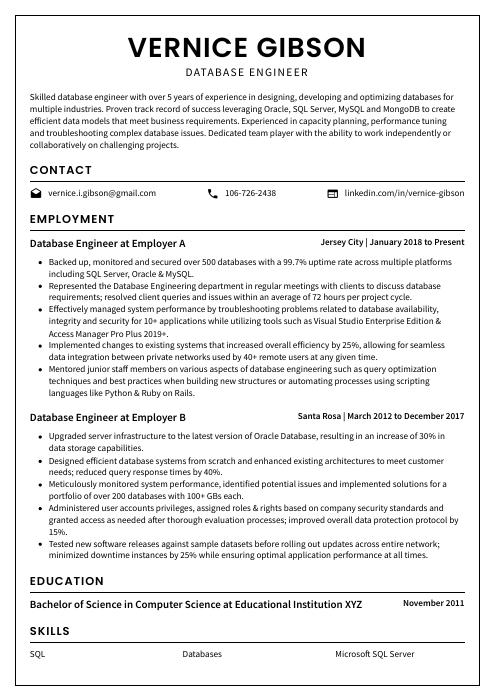 Cormorant
Cormorant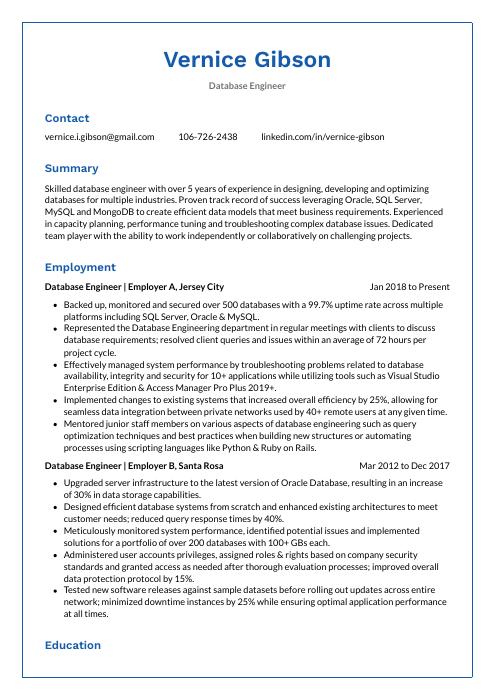 Markhor
Markhor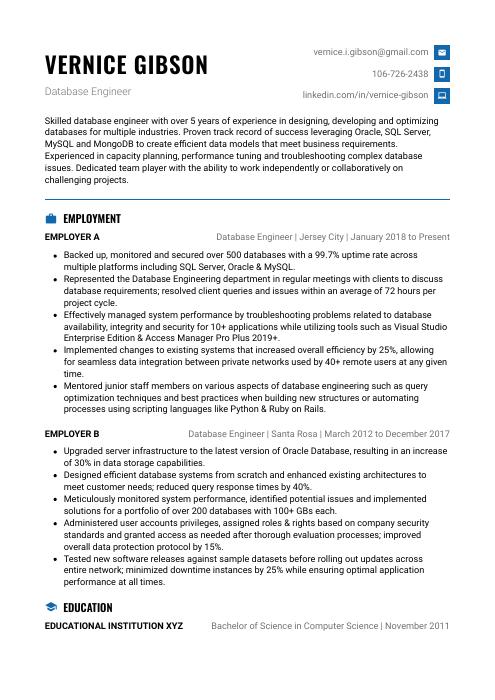 Echidna
Echidna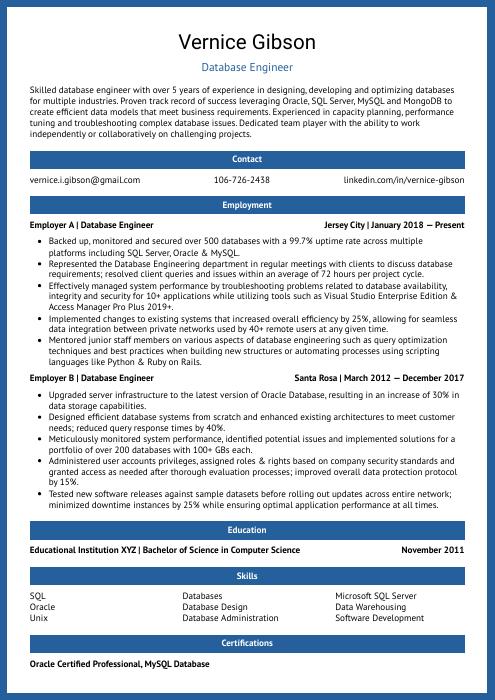 Ocelot
Ocelot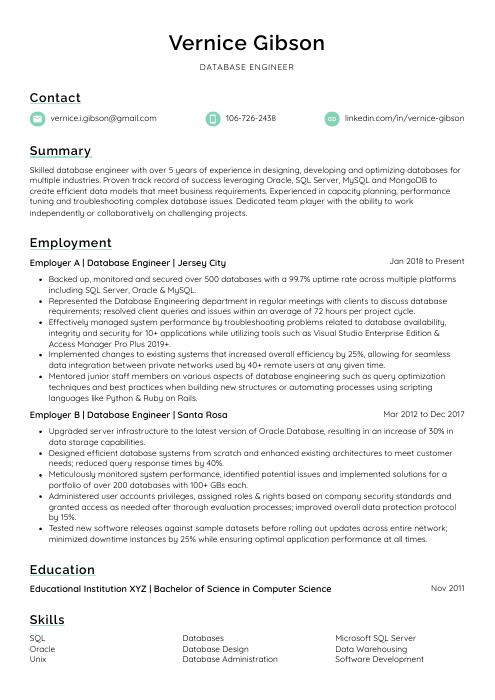 Lorikeet
Lorikeet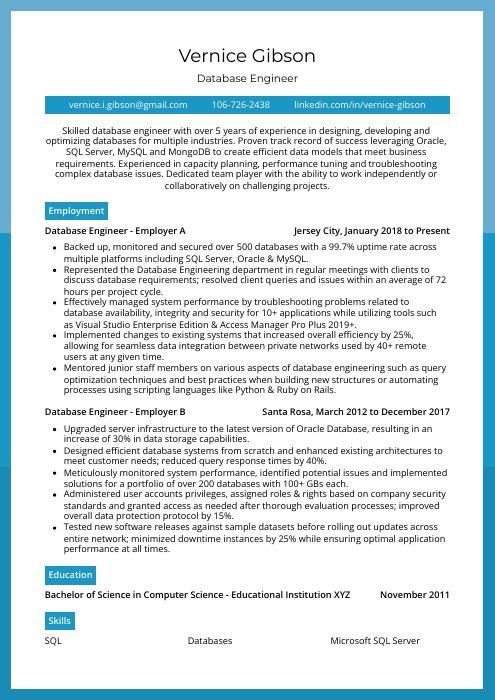 Rhea
Rhea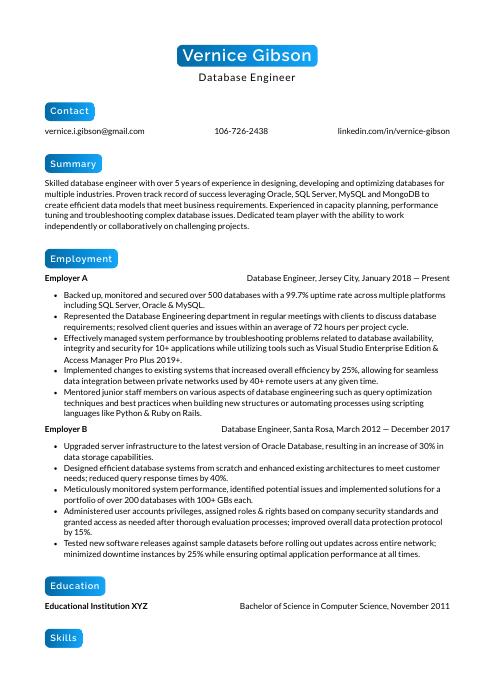 Kinkajou
Kinkajou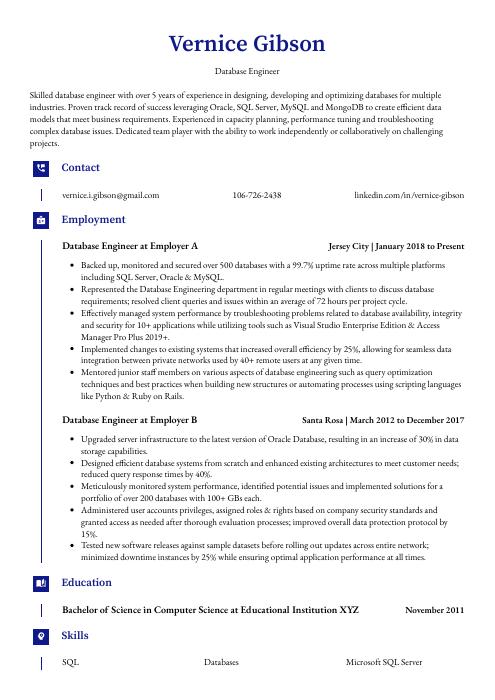 Gharial
Gharial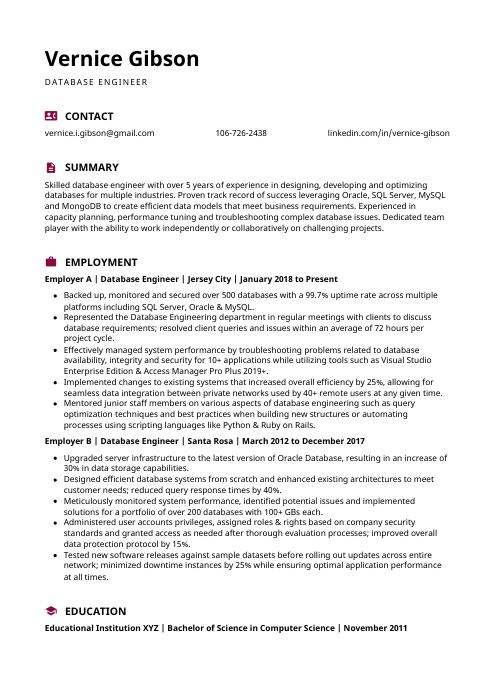 Hoopoe
Hoopoe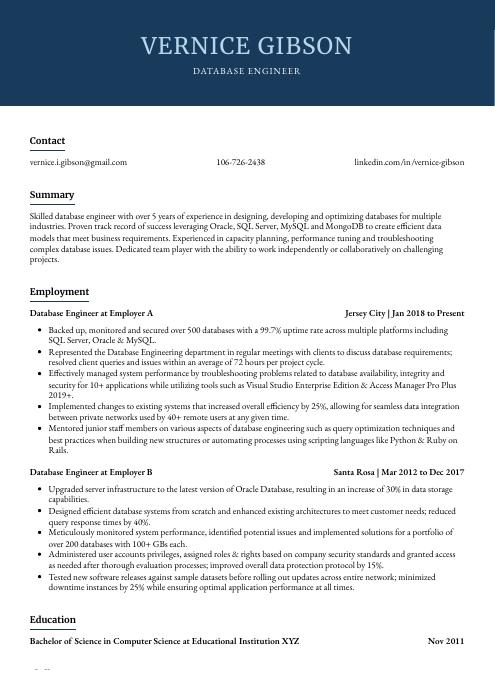 Bonobo
Bonobo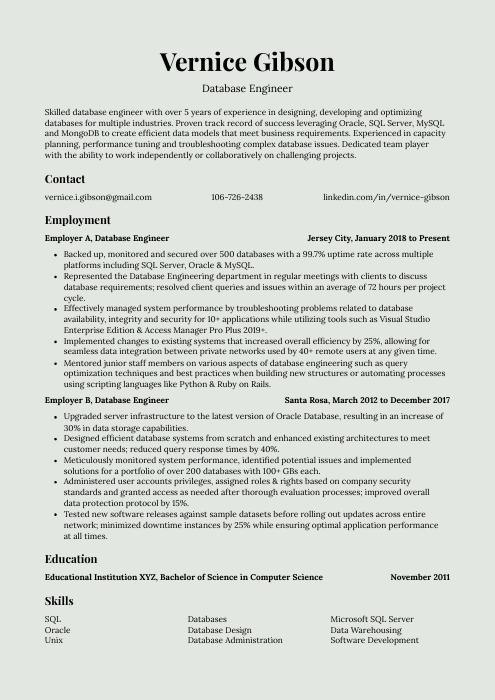 Saola
Saola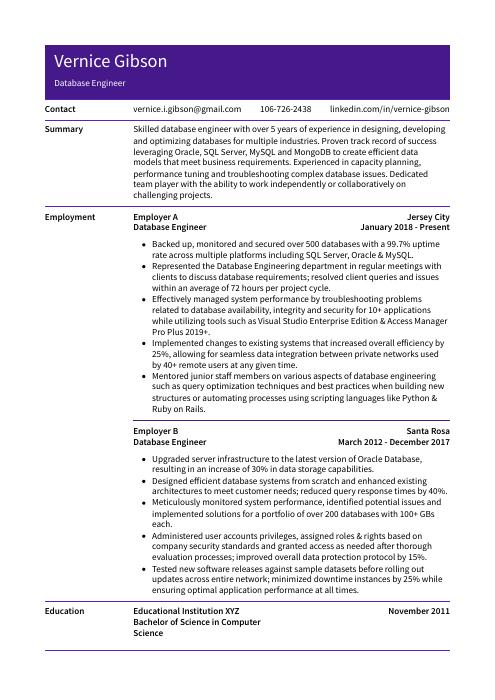 Pika
Pika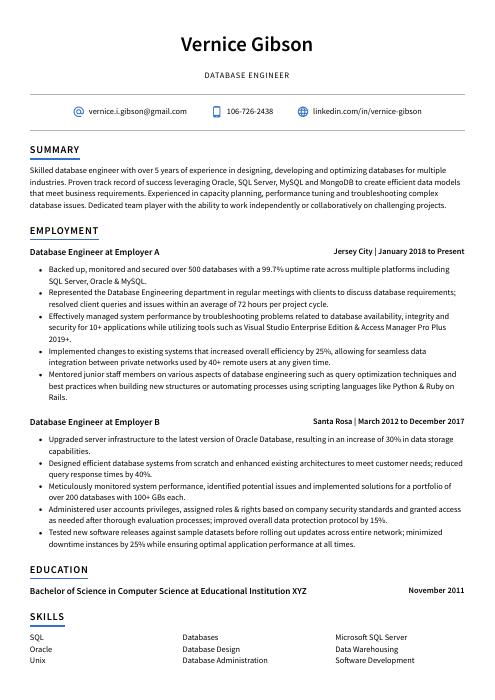 Axolotl
Axolotl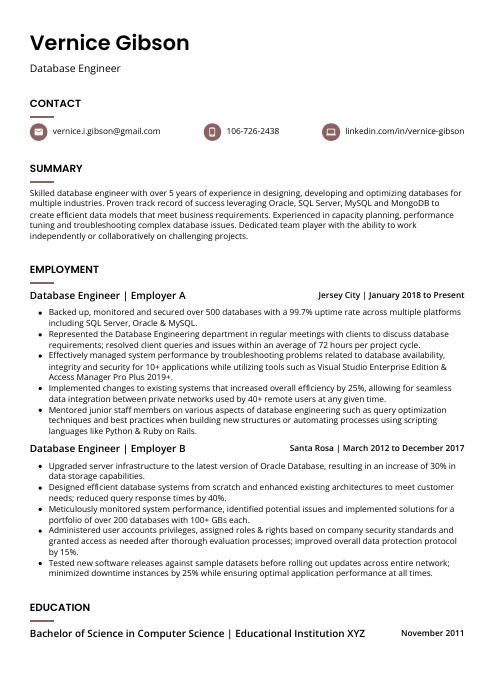 Fossa
Fossa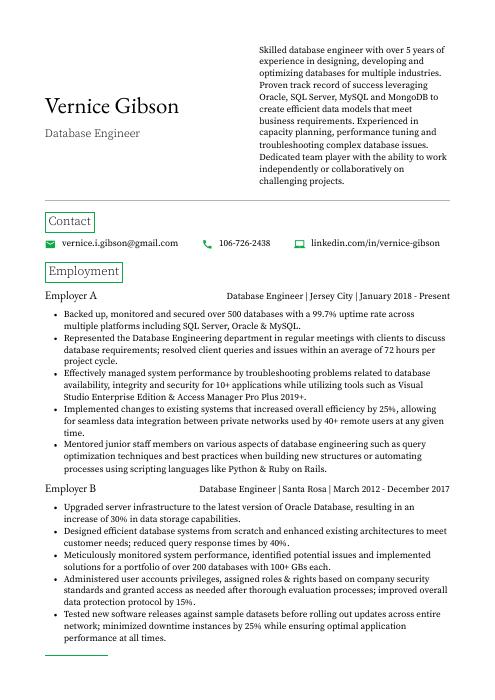 Quokka
Quokka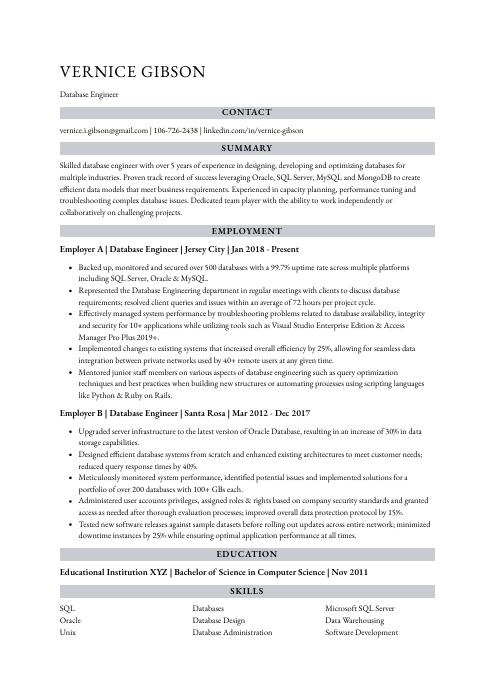 Numbat
Numbat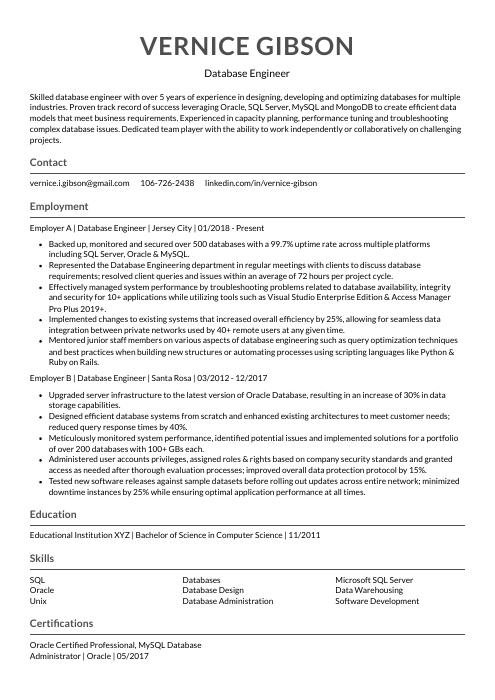 Indri
Indri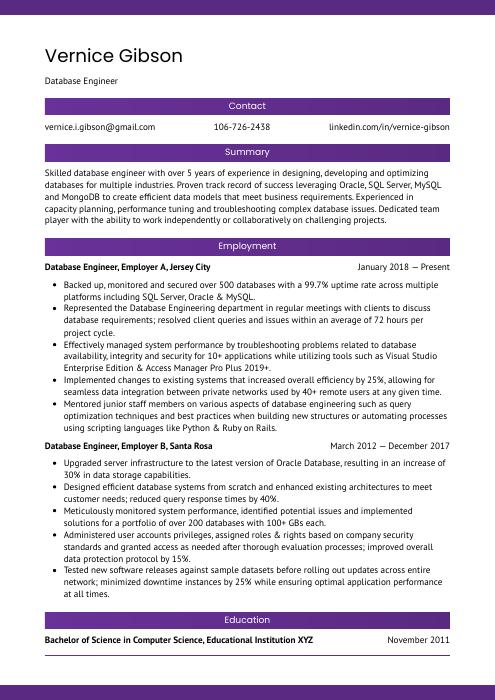 Jerboa
Jerboa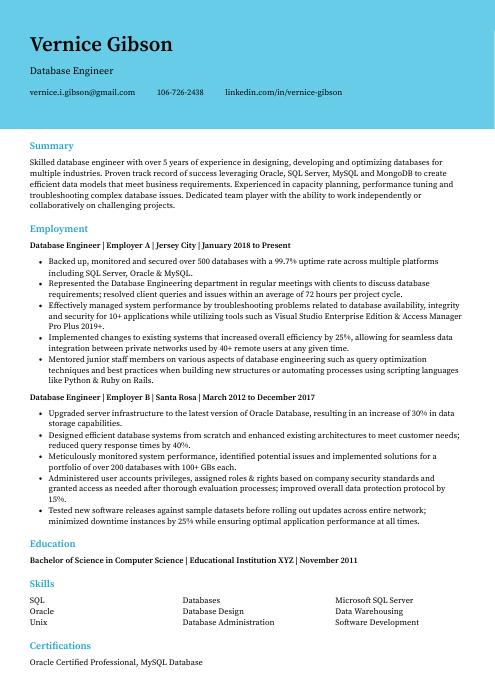 Dugong
Dugong Rezjumei
Rezjumei
